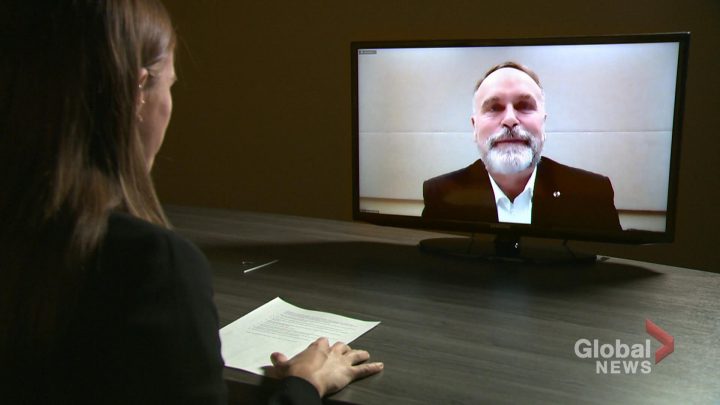Gordon Asmundson, a University of Regina psychology professor, is one of a number of behavioural scientists studying the attitudes behind the anti-mask movement during the COVID-19 pandemic.

Amundson helped conduct a study last summer that surveyed roughly 2,000 Canadians and Americans. It found 84 per cent of respondents wore masks while 16 per cent did not.
Global News spoke with Asmundson about the study.
Q – What did you find were the reasons behind the people not wearing masks?
A – We found that there were two things primarily explaining those who did not wear masks. That was the belief that masks are ineffective and then this personality variable known as psychological reactance.
Q – What is psychological reactance?
A – Psychological reactance is a response to rules and regulations that threaten one’s sense of personal control, autonomy or freedom of choice. We see that a lot in children when they’re told what to do and they sort of dig in and say, ‘you’re not the boss of me.’ So that’s really, in essence, psychological reactance, but it carries through development and into adulthood.
Q – Are we seeing a lot of those anti-mask attitudes carry over into other rules and regulations that are being brought up in the COVID-19 pandemic?
A – We’re finding an association between psychological reactance and the anti-mask attitudes, as well as other disregard for COVID-related threats. So the tendency to believe that it’s overestimated or it’s not real and the belief that one has robust personal health and ‘COVID is not going to affect me.’ Political conservatism is common among that sort of network of beliefs, as are personality traits of self-centeredness, anger and impulsivity. Now, that doesn’t mean that everybody who doesn’t want to wear a mask has all of those traits, but they tend to sort of group together.

Get breaking National news
Q – Is there a sense that the anti-mask mentality is growing, the longer this pandemic carries on?
A – It’s fluctuating and it differs in different regions depending on what the public health measures are. It also is likely to be fluctuating with frustration and other aspects that go along with mixed messaging and unclear guidance. We have just finished the fourth wave of our data collection in Canada and the United States just this week and so we’ll actually be able to look at where things are at this point in time in relation to our earlier waves. But it’s likely the case that it sort of waxes and wanes over time.

Q – What is the way to combat these types of anti-mask attitudes?
A – One strategy would be to increase science attitudes and scientific literacy. But there are also other strategies that are evidence-based to deal with anti-mask attitudes, and those are very subtle, persuasive strategies that address psychological reactance.
Q – Can we learn anything from this pandemic moving forward to really address our pandemic response in the future?
A – That’s a very significant component of our research and of others who are conducting research on the psychological aspects of pandemics so that we actually are in a better position to respond when the next pandemic strikes. We know that behavioral factors are very important, not only in the early stages of viral spread, but throughout that as we’ve seen with challenges in following public health measures and dealing with lockdowns and being asked to wear masks, to wash our hands, to keep our distance. So we’re hoping that we can learn many things that will help us be more prepared to help people with those challenges when the next pandemic starts.










Comments